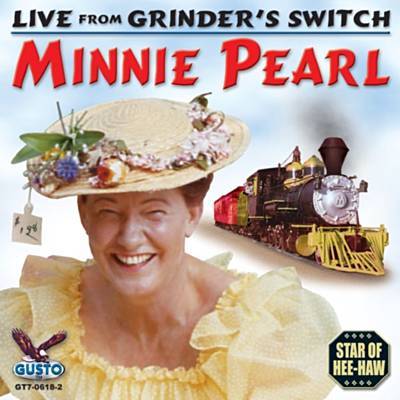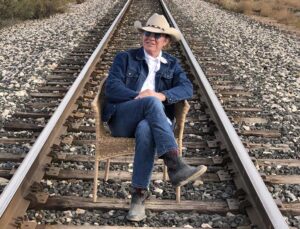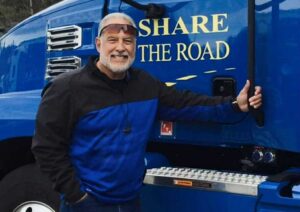In early 1966, Red Sovine had his second No. 1 hit on Billboard’s Hot Country Singles chart with “Giddy-Up-Go.” As many songs of the era did, upon reaching No. 1, it stayed a while, maintaining its position for six weeks. The recording, like Sovine’s other trucking songs, was characterized by its recited lyrics and attempt to present truck drivers as sentimental rather than an outlaw group of workers. In later years, for better or worse, Sovine followed the pattern with “Phantom 309” and “Teddy Bear.”
The “Giddy-Up-Go” story features a truck-driving father abandoned by a wife who took his young son with her. The driver never found his family. Before the boy’s mother took him away, the youngster called his dad’s truck “Giddy-Up-Go,” words his dad painted on the truck. Many years passed before the father saw the same phrase on another truck along U.S. Highway 66. As one can imagine without even hearing the song, the phrase led to a much-delayed father-son reunion.
Since “Jaws” became a national sensation in movie theaters in 1975 and was followed by a sequel in 1978, spin-offs, remakes and covers have become an expectation among fans. These types of films, TV shows and songs don’t require much creativity and can be turned out quickly and the original stars often return to build their success. Of course, the sequel never bests the original and is often added to the list of entertainment’s worst decisions.
In the 1960s, sequels and remakes had yet to become popular. Singers and songwriters had a world of uncharted territory they could use to build legacies. But, with “Giddy-Up-Go,” a most unlikely source saw Sovine’s hit song as an early exception to the rule and tried to capitalize on it.
Minnie Pearl (born Sarah Colley) is arguably the best-known comedian, male or female, in country music history. She spent over 50 years on the Grand Ole Opry and 22 years as a cast member of the television show credited with introducing country music to a national audience, “Hee-Haw.” A native of Tennessee and graduate of what would become Belmont University, Pearl was trained in theater and dance.
During her career, Pearl recorded comedy albums, wrote several books and appeared on television. But she was never a singer. Then again, at least in many of his trucking songs, neither was Sovine. Perhaps the chance to release a “recited” single with chart-making potential motivated Pearl. In what was clearly an attempt to capitalize on the success of “Giddy-Up-Go,” Pearl inexplicably recorded a sequel, “Giddy-Up-Go Answer.” It debuted just weeks after the original fell from the No. 1 spot on country radio.
In Pearl’s recording, one briefly hitting No. 1 on the country charts itself, she retells “Giddy-Up-Go” from the perspective of a waitress at the truck stop where Sovine’s father and son reunited. As fate would have it, the waitress was a friend of the wife who abandoned her truck-driving husband.
One might expect “Giddy-Up-Go Answer” (what kind of title is that?) to be a statement from a strong-willed wife who left a husband who cared more for spending weeks alone in his truck than taking care of his family. But that is not the case. Instead, Pearl describes a wife who left with her son without a trace or a reason. In Pearl’s version of the story, she does mention that the wife had developed a terminal disease — something she apparently didn’t tell her husband.
“So, without leaving a trace, she took her son and left town one night,” was the lyric spoken by Pearl in response to the wife’s knowing she needed to move to a dry climate. The wife and Pearl’s character became good friends, and Pearl recalled chats about the man left behind and the son growing into the image of his father. The wife soon dies, and Pearl continues working as a waitress, waiting for the “Giddy-Up-Go” truck to arrive. As it must, the song ends with Pearl witnessing the father-son reunion.
“Giddy-Up-Go Answer” answers little, but it does leave a question for listeners to ponder. “Why?” Why did Pearl record the tune? Why did she think the original story needed an answer? Why did she think Sovine fans sought an answer? Why did she not think Sovine would have revealed an answer if it mattered? “Answer” is nothing more than a retelling of Sovine’s story from an onlooker’s perspective — an onlooker without any insight or information to add the story. At the end, the listener is left unsatisfied.
Sovine’s “Giddy-Up-Go” was completely in the artist’s character and played well to his audience — truck drivers. Pearl, on the other hand, stepped out of her role as a beloved country comedian to record what, for many, was a meaningless single. But the 1960s were different times, and country music had far less variety than future decades would offer. “Giddy-Up-Go Answer” was Pearl’s first and last charting song; in fact, it was the first and last song she recorded, period.
Over the span of 54 years, Sovine’s “Giddy-Up-Go” remains a high point of trucking music history. Pearl’s “Answer” is mostly forgotten. And if Pearl ever doubted why her song lacked staying power, she might ask the truck-driving father when he pulls into her truck stop.
“Sorry, Minnie,” he’ll say. “Giddy-Up-Go heard your song… and he done got up and went.”
Be assured, no fan of trucking music is left asking, “Why?”
Until next time, don’t lose sight of that white line, and if you come across a trucking song or any country tune that makes you ask, “Why?” drop me a line. Perhaps I can come up with an answer that makes some sort of sense.
Since retiring from a career as an outdoor recreation professional from the State of Arkansas, Kris Rutherford has worked as a freelance writer and, with his wife, owns and publishes a small Northeast Texas newspaper, The Roxton Progress. Kris has worked as a ghostwriter and editor and has authored seven books of his own. He became interested in the trucking industry as a child in the 1970s when his family traveled the interstates twice a year between their home in Maine and their native Texas. He has been a classic country music enthusiast since the age of nine when he developed a special interest in trucking songs.










